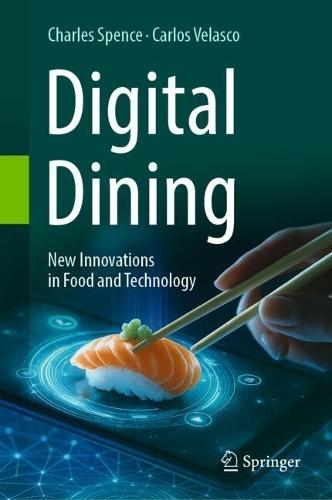Overview
From the earliest stone tools to the latest AI-driven innovations, our relationship with food has always been shaped by technology. In “Digital dining: New innovations in food and technology”, Charles Spence and Carlos Velasco explore how emerging digital tools and technologies, such as smartphones, 3D printing, artificial intelligence, robots, and extended reality, are transforming the way we prepare, consume, and experience food. Diving into the intersections of tradition and innovation, culture and science, this book offers a thought-provoking journey through the world of gastrophysics and multisensory experience design. Will digital technology enrich our culinary experiences or erode the human touch? With insights from leading experts, real-world applications, and a critical lens on the ethical and cultural implications, this book invites readers to explore the tantalising possibilities and challenges of a rapidly changing food landscape. Whether you are a researcher, food enthusiast, a tech innovator, or a curious thinker, this book will provide you with a new lens to see, taste, and experience the future of food.
Full Product Details
Author: Charles Spence ,
Carlos Velasco
Publisher: Springer International Publishing AG
Imprint: Springer International Publishing AG
ISBN: 9783031910494
ISBN 10: 3031910494
Pages: 334
Publication Date: 12 July 2025
Audience:
Professional and scholarly
,
Professional & Vocational
Format: Hardback
Publisher's Status: Active
Availability: Not yet available

This item is yet to be released. You can pre-order this item and we will dispatch it to you upon its release.
Author Information
PROF. CHARLES SPENCE Professor Charles Spence is a world-famous experimental psychologist with a specialization in neuroscience-inspired multisensory design. He has worked with many of the world’s largest companies across the globe since establishing the Crossmodal Research Laboratory (CRL) at the Department of Experimental Psychology, Oxford University in 1997. Prof. Spence has published over 1,200 academic articles and edited or authored, 16 books including, in 2014, the Prose prize-winning “The perfect meal”, and the international bestseller “Gastrophysics: The new science of eating” (2017; Penguin Viking) – winner of the 2019 Le Grand Prix de la Culture Gastronomique from Académie Internationale de la Gastronomie. His latest book Sensehacking was published in 2021. Much of Prof. Spence’s work focuses on the design of enhanced multisensory food and drink experiences, through collaborations with world-leading chefs, baristas, mixologists, chocolatiers, perfumiers, and the food and beverage, and flavour and fragrance industries. Prof. Spence has worked extensively on the question of how technology will transform our dining/drinking experiences in the future, and has been profiled in The New Yorker (http://www.newyorker.com/magazine/2015/11/02/accounting-for-taste). ASSOCIATE PROFESSOR CARLOS VELASCO Carlos Velasco is associate professor at the Department of Marketing, BI Norwegian Business School (Norway), where he co-founded the Centre for Multisensory Marketing. Carlos received his D.Phil. in Experimental Psychology from Oxford University, after which he worked in a number of postdoctoral and consulting projects in Europe, Asia, and North and South America. His work is situated at the intersection between Psychology, Marketing, and Human–Computer Interaction, and focuses on understanding, and capitalizing on, our multisensory experiences and their guiding principles. Carlos has published over 100 academic articles in these fields and has authored or edited eight books. Recently, he co-wrote the book ""Multisensory experiences: Where the senses meet technology"" (Oxford University Press). Carlos has worked with a number of companies from around the world on topics such as multisensory experiences, food and drink, branding, and consumer research. For more information, visit https://carlosvelasco.info/




